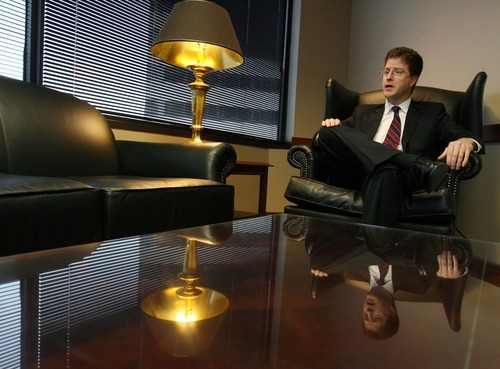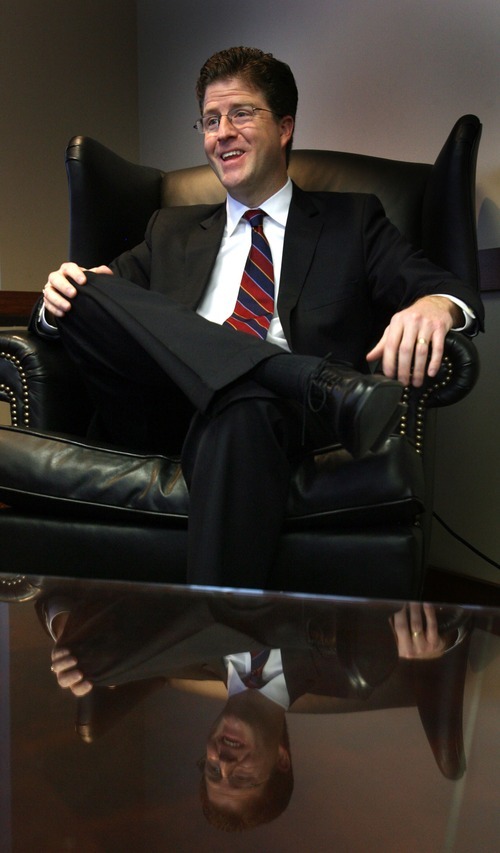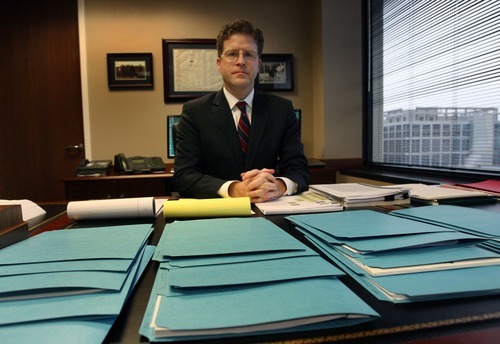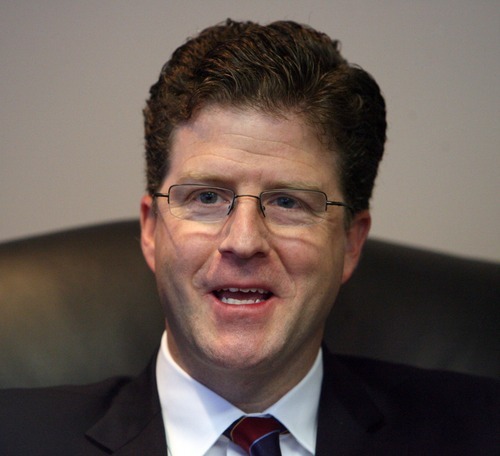This is an archived article that was published on sltrib.com in 2012, and information in the article may be outdated. It is provided only for personal research purposes and may not be reprinted.
He's only 40, but David Barlow already has a lifetime's worth of achievements to choose from when contemplating the most satisfying moments of his career.
There are the 10 years spent working on complicated business litigation at Chicago-based Sidley Austin — the same firm where President Barack Obama and his wife, Michelle, spent time practicing law.
There is the time spent at Yale Law School, which followed four years at BYU, where he graduated in 1995 at the top of his class with a 4.0 GPA.
And there are prestigious awards and internships, including his distinction as a Harry S. Truman Scholar.
But for Barlow, Utah's newest U.S. attorney, some of the most memorable moments so far have come from working in an environment with darker undertones: the world of domestic violence victims fighting to have their voices heard.
"The cases I am most proud of involve pro bono work. That was very rewarding because it involved people who desperately needed someone to come in and help make things right for them," said Barlow,recalling how he volunteered in Chicago to represent victims in domestic violence cases. His work earned him the Domestic Violence League Clinic's Lawyer of the Year Award in 1999 for pro bono work.
It also sparked a zeal for public service that would eventually lead Barlow to accept the nomination to become Utah's next U.S. attorney.
"That public nature of the work was deeply satisfying. Now I get to do that sort of thing every day. I get to wake up every day and say what can I do to help the public and make a difference?"
—
Road map to a presidential appointment • Barlow, born in Provo and raised in Idaho and California, had moved his family to the Beehive State and was commuting to Sidley Austin's offices in 2010 when college pal Mike Lee approached him about serving as his chief counsel in Washington, D.C.
The newly elected Republican senator, a lawyer himself, knew it was a long shot that Barlow might choose to work in Washington, particularly since Barlow had built a name for himself at Sidley Austin. But Lee — son of former BYU President Rex Lee, who incidentally was one of Barlow's college mentors — decided to ask anyway.
"It was a hail Mary pass," Lee recalled. "I was talking to him one night shortly after my election and the thought just occurred to me, 'Wouldn't it be fantastic if I could somehow convince David to come and work for me for a period of time?'
"I threw the idea out there hoping that there would be some chance he would consider it. I was not overly optimistic … but I was thrilled when he accepted."
Barlow changed his commute from Utah to Washington, where he earned a reputation on Lee's staff as the go-to guy for complicated legal matters and sound common-sense advice. It wasn't long before Lee again turned to Barlow with yet another job proposal: Would Barlow consider becoming the next U.S. attorney for Utah?
The position had been empty since 2009, when former U.S. Attorney Brett Tolman, a Bush administration appointee, resigned to take a job with a Salt Lake City firm. While veteran prosecutor Carlie Christensen filled in after Tolman's departure, Lee said the list of candidates for Tolman's replacement was sparse.
"Not only had the White House not nominated anyone, there were no nominees in the pipeline," Lee said. "All of a sudden the idea came up: Why don't they ask David?"
Before Barlow's appointment, Obama had considered Scott Burns, a Republican who was the deputy director of the White House Office of Drug Control Policy under President George W. Bush.
The White House also rejected David Schwendiman — a Democrat and longtime prosecutor in the U.S. Attorney's Office who worked war crimes in Bosnia — for undisclosed reasons. And Brent Baker, an attorney for the SEC, dropped out of consideration for appointment because the process was taking too long.
Barlow, who was endorsed both by Lee and Sen. Orrin Hatch, was nominated last summer and swiftly confirmed.
The appointment, however, initially riled some Democrats, who saw Barlow's brief employment with Lee, a prominent tea party figure, as a reason to disqualify him as a candidate.
"I think it's a travesty," Todd Taylor, executive director of the Utah Democratic Party, told The Salt Lake Tribune in July. "There is a phenomenally talented bunch of Democratic attorneys in the state of Utah. To have to make that kind of political compromise is just ridiculous."
Taylor said the party had recommended more than a half-dozen qualified candidates and none received a nod from the White House.
—
Settling in • Barlow takes the political controversy surrounding his appointment in stride, saying he was honored to receive Obama's endorsement in addition to that of Lee, Hatch and the Senate Judiciary Committee, who reviewed his credentials.
During his time at Sidley Austin, he led groups of more than 100 attorneys across the country in civil cases involving medical products and pharmaceuticals.
Lee recalled that Barlow earned the nickname "Dr. Barlow" during his time at Sidley, because of his intellectual ability to wrap his mind around technical issues in the case. Doctors and scientists would often be surprised by how well Barlow understood the specialty material in the cases, Lee said.
"He would really study product liability case involving complex medical issues. He threw himself into the case and before long he knew everything about those issues," Lee said.
Those who've worked with Barlow before say his ability to consider other viewpoints is a trait that will help him succeed as U.S. attorney.
At the December ceremony at Salt Lake City's federal courthouse during which Barlow was officially sworn in, Michael W. Davis, a lawyer at Sidley Austin, recalled being leery of hiring Barlow for a job in Chicago because he feared Barlow would be a "know-it-all." With Barlow's impeccable credentials and internships under his belt at the U.S. Attorney's Office in Connecticut and a handful of private firms, Davis wondered if Barlow was a team player.
Davis said he was pleasantly surprised to realize Barlow made efforts to learn from others and likes to laugh. He said Barlow can recite lines from Plato, Aristotle and complex legal opinions — and just as readily can pull quotes from the 1987 comedic fairy tale "The Princess Bride."
"He takes work seriously but doesn't take himself seriously," Davis said. "Our loss is your gain. He will serve the bench … and the people of Utah very well indeed."
Barlow takes the helm of an office that has seen more than its share of high-profile cases in the past year. Among them:
• Prosecuting climate activist Tim DeChristopher for sabotaging a Bureau of Land Management auction of oil and gas leases
• Handling the multidefendant racketeering case against members of the Tongan Crip Gang
• Pursing a case against St. George businessman Jeremy Johnson for fraud.
In 2011, the U.S. Attorney's Office in Utah filed 874 felony cases against a total of 1,057 defendants, according to statistics from the Executive Office for U.S. Attorneys. Those numbers are up from a few years ago; in 2007 the office filed 738 felony cases against 950 defendants.
The office's work garnered national recognition recently, when the legal team that persevered in a case against Brian David Mitchell for the 2002 kidnapping and rape of Elizabeth Smart was honored in Washington, D.C., for its achievement.
U.S. Attorney General Eric Holder last month honored the Utah litigation team of assistant U.S. Attorneys Felice John Viti, David F. Backman and Diana Hagen; victim witness coordinator Cecelia Swainston; supervisory litigation support specialist Yvette G. Laughter; FBI Special Agent Eric Lerohl; and Deputy Salt Lake County District Attorney Alicia Cook, who also holds the title of special assistant U.S. attorney. The group received an award for "Superior Performance by a Litigative Team" and recognized the federal team's efforts to keep Mitchell's case alive after it stalled in state court.
Barlow said he's pleased to work in an office with talented attorneys and hopes to build on the office's recent successes. But, he noted, winning cases isn't everything.
He borrowed a quote from George Sutherland, the only Utahn to serve on the U.S. Supreme Court, when describing what he believes his role should be in serving as U.S. attorney.
"To see that guilt shall not escape or innocence suffer," Barlow said, referring to Sutherland's comments in the 1935 case Berger v. U.S.
"The job of this office is to do justice. It's not to win its cases, per se. But to do our best in carefully selecting cases for prosecution. We must ask, 'What's the right thing to do? What would be just?' "
—
Priorities • Barlow has spent much of his nearly three months as U.S. attorney getting to know the 90 staff members in his office, as well as law enforcement agencies, community members and other entities that are connected to the work the office does.
After he's had a chance to more thoroughly analyze the office's strengths and challenges, he said he may implement some changes to make improvements that he believes are needed.
He'll lead in a time of resource challenges — a hiring freeze has prevented any new attorneys from being hired for months. The office once boasted a staff of more than 100, has been stuck at an understaffed level for some time, Barlow said.
"There is always a greater appetite to do good than resources to do it," Barlow said. "Taking one case may mean we need to have another case handled a different way."
He complimented the office on its work and said priorities in the coming year include fighting terrorism, prosecuting violent crime and continuing to investigate financial fraud.
So far, he said, he's enjoying his new position and is excited to move the office forward in 2012.
"There is a lot to be impressed with," Barlow said. "This office is full of experienced criminal prosecutors and those who have an expertise in civil litigation. They share that same zeal of knowing that your job is to do justice, to do your best to do the right thing."
Twitter: @mrogers_trib —
Caseloads rise
Prosecutors in the U.S. Attorney's Office in Utah have handled rising caseloads in recent years. Here's a look at the numbers:
Fiscal year cases filed defendants
2007 • 738 cases 950
2008 • 802 cases 969
2009 • 1,056 cases 1,200
2010 • 923 cases 1,066
2011 • 874 cases 1,057
Source: Executive Office for U.S. Attorneys —
David Barlow
Married,wife Crystal; four children ages 6 to 16
Born 1971 in Provo; family also lived in California and Idaho
Was an extern for U.S. District Court Judge Peter Dorsey in New Haven, Conn.
Was the Truman Scholar Intern to the policy director at the Department of Health and Human Services Office of Child Support Enforcement
Donated 200 hours to the case of David Ayala, the former leader of Chicago's Two-Sixers gang who was arrested in 1983 at age 18 for fatally shooting two members of the Latin Kings street gang. Barlow pursued civil rights claims on behalf of Ayala.
Source: United States Senate Committee on the Judiciary Questionnaire for Non-Judicial Nominees









